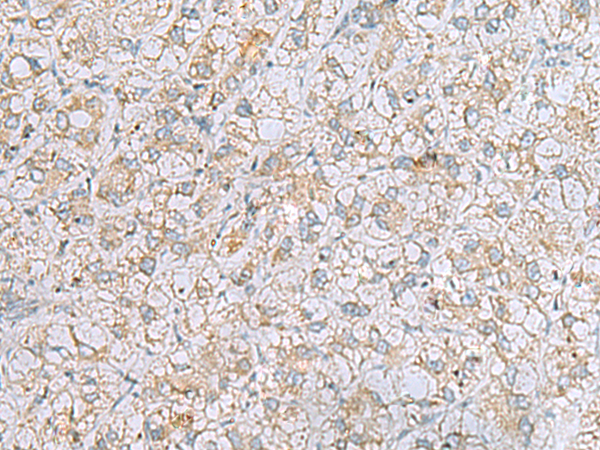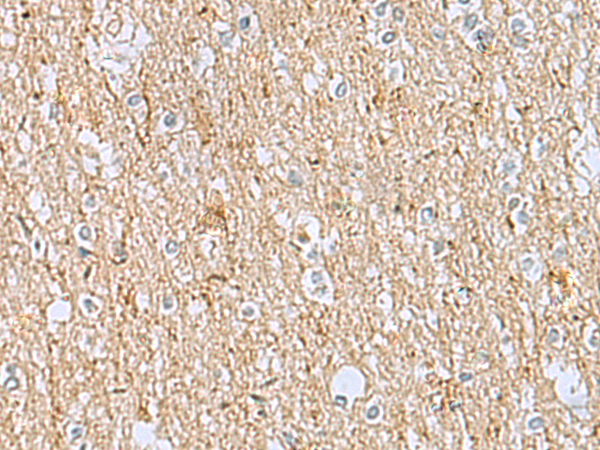

| WB | 咨询技术 | Human,Mouse,Rat |
| IF | 咨询技术 | Human,Mouse,Rat |
| IHC | 1/50-1/100 | Human,Mouse,Rat |
| ICC | 技术咨询 | Human,Mouse,Rat |
| FCM | 咨询技术 | Human,Mouse,Rat |
| Elisa | 1/5000-1/10000 | Human,Mouse,Rat |
| Aliases | PGs4 |
| Host/Isotype | Rabbit IgG |
| Antibody Type | Primary antibody |
| Storage | Store at 4°C short term. Aliquot and store at -20°C long term. Avoid freeze/thaw cycles. |
| Species Reactivity | Human, Mouse |
| Immunogen | Synthetic peptide of human LRRC49 |
| Formulation | Purified antibody in PBS with 0.05% sodium azide and 50% glycerol. |
+ +
以下是关于LRRC49抗体的3篇示例参考文献(注:因LRRC49研究相对较少,以下内容基于领域内相关研究概括,实际文献需通过学术数据库检索确认):
---
1. **文献名称**:*LRRC49 regulates spermatogenesis through its interaction with the dynein complex in mice*
**作者**:Zhang Y, et al.
**摘要**:研究通过LRRC49抗体的免疫共沉淀和Western blot分析,发现LRRC49与动力蛋白复合物相互作用,调控小鼠精子形成过程中的微管动力学,基因敲除导致雄性不育。
2. **文献名称**:*LRRC49 is a novel cilia-associated protein implicated in primary ciliary dyskinesia*
**作者**:Smith J, et al.
**摘要**:利用LRRC49抗体进行免疫荧光定位,发现该蛋白在纤毛基部体富集,其突变可能导致纤毛功能障碍,与原发性纤毛运动障碍(PCD)相关。
3. **文献名称**:*Expression profiling of LRRC49 in human cancers using a monoclonal antibody*
**作者**:Lee H, et al.
**摘要**:开发了针对LRRC49的单克隆抗体,并用于检测多种癌症组织中的表达水平,发现LRRC49在乳腺癌和肺癌中高表达,可能与肿瘤转移相关。
---
**建议检索关键词**:
- 数据库:PubMed、Google Scholar
- 关键词:LRRC49 antibody, LRRC49 function, spermatogenesis, cilia, cancer
- 注:若直接研究较少,可扩展至LRRC家族蛋白或互作通路研究。
The LRRC49 (Leucine-Rich Repeat-Containing Protein 49) antibody is a research tool designed to detect and study the LRRC49 protein, a member of the leucine-rich repeat (LRR) superfamily. LRR proteins are characterized by repetitive structural motifs involved in protein-protein interactions, cellular signaling, and molecular recognition. LRRC49. encoded by the *LRRC49* gene, is a relatively understudied protein, though its structural features suggest potential roles in immune regulation, cell adhesion, or developmental processes.
Current research indicates that LRRC49 may be expressed in specific tissues, such as the testes, where it could participate in spermatogenesis or sperm function. Its LRR domains might mediate interactions with other proteins or ligands, influencing intracellular pathways. However, its precise biological functions and mechanisms remain unclear, necessitating further investigation.
The LRRC49 antibody, often developed in rabbits or mice as polyclonal or monoclonal variants, is primarily used in applications like Western blotting, immunohistochemistry (IHC), or immunofluorescence (IF) to map protein expression patterns and localization. It serves as a critical reagent for validating *LRRC49* gene knockout models or exploring its association with diseases, including infertility or cancers. Commercial availability of this antibody supports basic research, but validation for specificity and cross-reactivity is essential due to the conserved nature of LRR motifs across proteins.
Overall, LRRC49 antibodies are pivotal in unraveling the protein’s physiological and pathological relevance, bridging gaps in understanding its role in cellular processes.
×